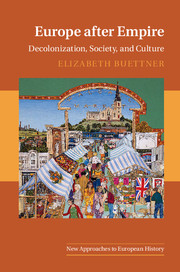Book contents
- Frontmatter
- Contents
- List of figures
- Acknowledgements
- Introduction
- Part I Decolonization for colonizers: Europe's transition to the postcolonial era
- 1 Myths of continuity and European exceptionalism: Britain, decolonization, and the Commonwealth family ideal
- 2 Occupation, resistance, and liberation: the road to Dutch decolonization
- 3 Soldiering on in the shadow of war: decolonizing la plus grande France
- 4 Long live the king? Belgium, the monarchy, and the Congo between the Second World War and the decolonization years
- 5 From rose-coloured map to Carnation Revolution: Portugal's overseas amputations
- Part II Migrations and multiculturalisms in postcolonial Europe
- Part III Memories, legacies, and further directions
- Epilogue: thoughts towards new histories of contemporary Europe
- Bibliography
- Index
1 - Myths of continuity and European exceptionalism: Britain, decolonization, and the Commonwealth family ideal
from Part I - Decolonization for colonizers: Europe's transition to the postcolonial era
Published online by Cambridge University Press: 05 June 2016
- Frontmatter
- Contents
- List of figures
- Acknowledgements
- Introduction
- Part I Decolonization for colonizers: Europe's transition to the postcolonial era
- 1 Myths of continuity and European exceptionalism: Britain, decolonization, and the Commonwealth family ideal
- 2 Occupation, resistance, and liberation: the road to Dutch decolonization
- 3 Soldiering on in the shadow of war: decolonizing la plus grande France
- 4 Long live the king? Belgium, the monarchy, and the Congo between the Second World War and the decolonization years
- 5 From rose-coloured map to Carnation Revolution: Portugal's overseas amputations
- Part II Migrations and multiculturalisms in postcolonial Europe
- Part III Memories, legacies, and further directions
- Epilogue: thoughts towards new histories of contemporary Europe
- Bibliography
- Index
Summary
Britain, dominion ‘daughters’, and India's road to independence
At midnight on 31 December 1929, the Indian National Congress (INC) greeted the prospect of a new year and a new decade with a new set of political demands: purna swaraj. Urged on by incoming President Jawaharlal Nehru, the INC passed the Purna Swaraj Resolution and soon settled on 26 January as Independence Day. At meetings throughout the country, a pledge would be read out proclaiming that ‘[t]he British Government in India has not only deprived the Indian people of their freedom but has based itself on the exploitation of the masses, and has ruined India economically, politically, culturally and spiritually. We believe, therefore, that India must sever the British connection and attain Purna Swaraj or complete independence.’
Purna swaraj marked a watershed within a nationalist struggle against Britain that originated in the late nineteenth century but whose momentum and mass participation had increased exponentially since the First World War. The 1930 pledge emerged as a product of British imperial policymaking since 1917, the Indian political demands it failed to fulfil, and the mounting non-cooperation campaigns they provoked. For the first time, India demanded not simply swaraj (home rule or self-rule) within the British empire but rather the right to break away from it. In so doing, India committed itself to a path that diverged sharply from precedents offered by Britain's dominions, which in 1930 included Canada, Newfoundland, Australia, New Zealand, South Africa, and the Irish Free State.
It would take another seventeen years for Britain to grant India its independence. During the interim, the rulers of empire proved reluctant to abandon their stated assumption that any future political advance in the Indian subcontinent would take place according to patterns established in white settler–dominated territories in the nineteenth century. In fact, the British proved as stubbornly resistant to shedding this notion as they once had been to accepting that India might one day follow in dominion footsteps in the first place. From the late 1830s and 1840s on, the so-called ‘white’ settler colonies enjoyed increasing autonomy over their internal affairs. Over time, they achieved ‘responsible government’ – effectively equivalent to full self-government – although Britain maintained control over their external relations. Starting in 1907, colonies with responsible government became known as ‘dominions’, a term distinguishing them from the Indian empire and other colonies directly ruled by Britain.
- Type
- Chapter
- Information
- Europe after EmpireDecolonization, Society, and Culture, pp. 23 - 77Publisher: Cambridge University PressPrint publication year: 2016



